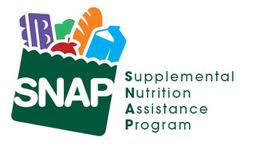 Over the course of one year, nearly 1 in 5 Mainers will rely on the federal Supplemental Nutrition Assistance Program (SNAP) to put food on the table. Even more, this figure is an underestimation of the number of people who go hungry in Maine, as many are unable to or prevented from utilizing SNAP. There are actions that both the state and the federal government can take to strengthen and protect SNAP and make it more effective in assuring the food security of all Maine families.
Over the course of one year, nearly 1 in 5 Mainers will rely on the federal Supplemental Nutrition Assistance Program (SNAP) to put food on the table. Even more, this figure is an underestimation of the number of people who go hungry in Maine, as many are unable to or prevented from utilizing SNAP. There are actions that both the state and the federal government can take to strengthen and protect SNAP and make it more effective in assuring the food security of all Maine families.
SNAP is a vital program that provides food for vulnerable Mainers across the state. Nationwide, according to the USDA, over 60 percent of the program’s participants in 2013 were children, elderly, or people with disabilities. SNAP was also crucial during the Great Recession. By design, SNAP costs rose substantially to meet the challenges of the severe recession and weak recovery in the last decade. However, the Congressional Budget Office (CBO) projects that SNAP expenditures will grow no faster than the economy in future decades, indicating that SNAP costs will not contribute to the nation’s long-term deficit.
Two important steps can improve SNAP: count job-seeking toward the eligibility work requirement and mandate that the able-bodied work requirement waiver for high areas of unemployment is an opt-out rather than opt-in for states.
In Maine, our jobs recovery has been inconsistent, and stringent SNAP work requirements mean that 6,500 people – some in Maine’s most economically distressed counties – lost their nutrition assistance this winter even though they are income-eligible and may be full-time job seekers. Under many federal programs, Congress allows job search efforts to count toward work requirements. Adding this to the SNAP work requirement would ensure that unemployed workers, especially in Maine’s rural counties, will not go hungry while they are looking for a job.
Though unemployment is declining statewide, thousands of Maine workers still struggle to find a job. Employment recovery in our three largest metropolitan areas: Portland, Lewiston, and Bangor –account for most of the improvement. In six of Maine’s thirteen rural counties, unemployment remains higher than the national average. In one survey conducted by the state’s Center for Workforce Research and Information, nearly 40 percent of jobs that are available were part-time or seasonal. A weak job market is no excuse to let Mainers go hungry.
Many would have retained their SNAP benefits and continued to be able to put food on the table if our state had requested a waiver of the able-bodied work requirement in labor surplus areas. The federal government should make this waiver automatic, proactively ensuring that less people go hungry instead of allowing a state to refuse the waiver for ideological reasons at the expense of the physical and financial security of its citizens.
Strengthening SNAP is critical to ensure that our nation, the wealthiest nation on earth, does not let its citizens go hungry.


